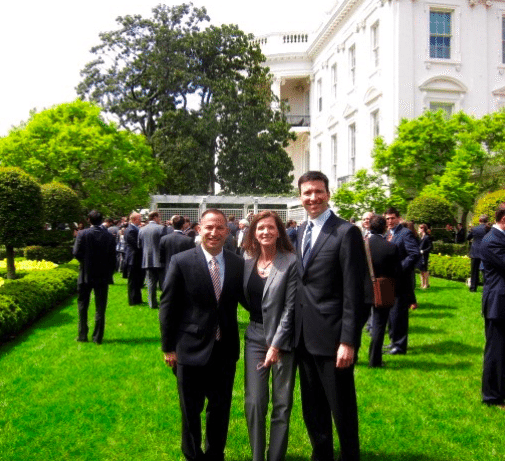“We believe the potential of crowdfunding is not about a single company or single crowdfunding platform. It is about the evolution from an institutional framework for allocating capital (otherwise known as banks, funds, and foundations) to a more individually driven framework enabled by existing and future technology advancements. We believe that these technologies will not only streamline the process of capital formation, but potentially increase transparency in the private capital markets as more information comes online, in real time.”
Entrepreneur Sherwood Neiss, Principal of Crowdfund Capital Advisors, is a 3-time INC500 winner whose company won E&Y’s Entrepreneur of the Year and during the credit crunch, frustrated with outdated securities laws co-founded Startup Exemption to initiate change. With fellow CCA Co-founder Jason Best, Neiss also co-authored the Crowdfunding Framework used in the JOBS Act that was signed into law by President Obama on April 5, 2012.
 Within Crowdfund Capital Advisors (CCA), Neiss works with clients ranging from governments and banks that are looking for ways to boost economic development in their countries to investment firms looking for access to increased deal flow that crowdfunding creates. In addition, Neiss serves as an advisor to several crowdfunding platforms and crowdfunding technologies. Neiss also co-founded the Crowdfunding Professional Association (CfPA), serving as Governing Board Member and co-chair. He also speaks globally about crowdfund investing and entrepreneurship, presenting to government bodies such as the U.S. Congress, leading SEC and FINRA meetings. CCA authored the World Bank’s research report “Crowdfunding’s Potential for the Developing World” that included a forward by Steve Case, co-founder of AOL.
Within Crowdfund Capital Advisors (CCA), Neiss works with clients ranging from governments and banks that are looking for ways to boost economic development in their countries to investment firms looking for access to increased deal flow that crowdfunding creates. In addition, Neiss serves as an advisor to several crowdfunding platforms and crowdfunding technologies. Neiss also co-founded the Crowdfunding Professional Association (CfPA), serving as Governing Board Member and co-chair. He also speaks globally about crowdfund investing and entrepreneurship, presenting to government bodies such as the U.S. Congress, leading SEC and FINRA meetings. CCA authored the World Bank’s research report “Crowdfunding’s Potential for the Developing World” that included a forward by Steve Case, co-founder of AOL.
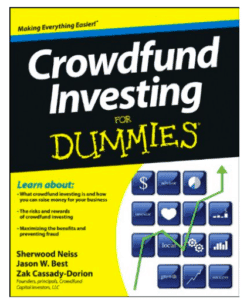 CCA principals Neiss and Best also the co-authored Crowdfund Investing for Dummies and Creating a Crowdfunding Ecosystem in Chile, published by the Multilateral Investment Fund. On behalf of CCA, Neiss has spoken about crowdfunding at global events like SXSW, the Global Entrepreneurship Summit and the World Economic Forum; Neiss and Best also have appeared together on CNN, BBC and CNBC, have been interviewed by the Wall Street Journal, New York Times, Washington Post, Bloomberg and Forbes.
CCA principals Neiss and Best also the co-authored Crowdfund Investing for Dummies and Creating a Crowdfunding Ecosystem in Chile, published by the Multilateral Investment Fund. On behalf of CCA, Neiss has spoken about crowdfunding at global events like SXSW, the Global Entrepreneurship Summit and the World Economic Forum; Neiss and Best also have appeared together on CNN, BBC and CNBC, have been interviewed by the Wall Street Journal, New York Times, Washington Post, Bloomberg and Forbes.
As the co-founder of FLAVORx, Neiss built a lucrative business model that generated millions of dollars in cash and while growing the business from one pharmacy to over 80% of the pharmacies in the United States. After raising millions of dollars in capital, Neiss sold the company in 2007. An avid traveler, Neiss lived in Japan for a year and, post-sale of FLAVORx, Neiss backpacked for the second time around the world.
In addition to his crowdfunding entrepreneurship, Neiss invests in real estate in the U.S. and Brazil, is part of a private equity group in Los Angeles, is working on a clean tech project in Puerto Rico and is involved with several other start-up ventures.
 This candid interview with Neiss is part of an exclusive series in conjunction with the 2015 Americas Alternative Finance Benchmarking Survey. The Survey, a joint venture of The Centre for Alternative Finance at University of Cambridge Judge Business School, the Polsky Center for Entrepreneurship and Innovation team at Chicago Booth School of Business and new partner Crowdfund Capital Advisors, is the first comprehensive and empirical assessment of crowdfunding, P2P lending and other forms of alternative finance across North, Central and South America. Due to a positive response, the Survey’s deadline has been extended until Friday, January 15.
This candid interview with Neiss is part of an exclusive series in conjunction with the 2015 Americas Alternative Finance Benchmarking Survey. The Survey, a joint venture of The Centre for Alternative Finance at University of Cambridge Judge Business School, the Polsky Center for Entrepreneurship and Innovation team at Chicago Booth School of Business and new partner Crowdfund Capital Advisors, is the first comprehensive and empirical assessment of crowdfunding, P2P lending and other forms of alternative finance across North, Central and South America. Due to a positive response, the Survey’s deadline has been extended until Friday, January 15.
I recently had the exciting opportunity to connect with Neiss via email and learn about his predictions about crowdfunding, mentors, his active involvement in regulation and crowdfunding initiatives, the genesis of FLAVORx, his next travel adventure and a sneak peek into the upcoming CCFA project. Our interview follows:
Erin: Why did the Crowdfund Capital Advisors decide to partner with the University of Cambridge Centre for Alternative Research and University of Chicago Booth School of Business 2015 Americas Alternative Finance Benchmarking Study? How will the benchmarking research findings help the industry?
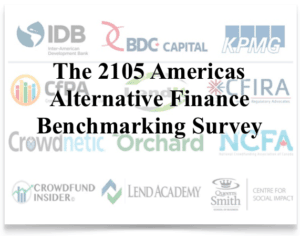 Woodie: Outside of the obvious need to solve the capital crisis, there are two incredibly important objectives in order for securities-based crowdfunding to succeed. One is education and the other is data analysis. We decided to partner with the University of Cambridge Centre for Alternative Research and University of Chicago Booth School of Business on the 2015 Americas Alternative Finance Benchmarking Study because the industry needed a credible source of accurate industry data and analysis. The industry is growing at a gazelle pace and the data that has been referenced to date has been met with skepticism. To have institutions of higher learning and ones with the caliber of Cambridge and Chicago be the lead on this project made it obvious. It was even easier for us to decide to partner with them after seeing the credibility of their European report, Moving Mainstream. The benchmarking research findings will help the industry because it will shed light on where investors are deploying capital and why. It will help issuers (aka entrepreneurs) better understand how to craft their campaigns to more successfully target investor dollars. And it will help regulators (both in the US and abroad) understand where and how Regulation Crowdfunding is both enabling and inhibiting the flow of capital. By looking into the data and analyzing the trends we can help address any of the bottlenecks that are in Regulation Crowdfunding.
Woodie: Outside of the obvious need to solve the capital crisis, there are two incredibly important objectives in order for securities-based crowdfunding to succeed. One is education and the other is data analysis. We decided to partner with the University of Cambridge Centre for Alternative Research and University of Chicago Booth School of Business on the 2015 Americas Alternative Finance Benchmarking Study because the industry needed a credible source of accurate industry data and analysis. The industry is growing at a gazelle pace and the data that has been referenced to date has been met with skepticism. To have institutions of higher learning and ones with the caliber of Cambridge and Chicago be the lead on this project made it obvious. It was even easier for us to decide to partner with them after seeing the credibility of their European report, Moving Mainstream. The benchmarking research findings will help the industry because it will shed light on where investors are deploying capital and why. It will help issuers (aka entrepreneurs) better understand how to craft their campaigns to more successfully target investor dollars. And it will help regulators (both in the US and abroad) understand where and how Regulation Crowdfunding is both enabling and inhibiting the flow of capital. By looking into the data and analyzing the trends we can help address any of the bottlenecks that are in Regulation Crowdfunding.
Erin: How did you transition to the alternative finance sector?
 Woodie: Necessity is the mother of invention. We tried to raised funds for a startup post the Global Financial Crisis (GFC). The capital markets had shut down and we were perplexed that everyone was complaining about the problem but not presenting any solutions. We saw the solution as merging the principals of crowdfunding with friends and family investing. However, having raised millions of dollars prior for our own companies we knew this was illegal based on laws written in 1933 & 34. So we crafted a framework to update the securities laws to the Internet Age and allow issuers to generally solicit funds from any investor as long as the process took place on regulated websites and via a defined set of rules. Once it became law, we helped launch the crowdfunding associations in the USA and started working on creating policy to enable securities based crowdfunding globally. We have now worked in over 35 countries.
Woodie: Necessity is the mother of invention. We tried to raised funds for a startup post the Global Financial Crisis (GFC). The capital markets had shut down and we were perplexed that everyone was complaining about the problem but not presenting any solutions. We saw the solution as merging the principals of crowdfunding with friends and family investing. However, having raised millions of dollars prior for our own companies we knew this was illegal based on laws written in 1933 & 34. So we crafted a framework to update the securities laws to the Internet Age and allow issuers to generally solicit funds from any investor as long as the process took place on regulated websites and via a defined set of rules. Once it became law, we helped launch the crowdfunding associations in the USA and started working on creating policy to enable securities based crowdfunding globally. We have now worked in over 35 countries.
Erin: You backpacked around the world, twice. What experiences and lessons did you bring off the trail? How have your international sojourns shaped your entrepreneurial world purview? Next travel plans?
 Woodie: The biggest lesson I learned from backpacking around the world is there are cultural nuances to the way people live and a general desire for people to strive to have a better life for themselves and their families. I walked away with a core belief that everyone is entitled to have their own line of thinking and we should respect other people’s belief as long as they aren’t causing harm to others. This philosophy has both elucidated my thinking about entrepreneurs globally but also helped shape my understanding of how investors care to approach the market.
Woodie: The biggest lesson I learned from backpacking around the world is there are cultural nuances to the way people live and a general desire for people to strive to have a better life for themselves and their families. I walked away with a core belief that everyone is entitled to have their own line of thinking and we should respect other people’s belief as long as they aren’t causing harm to others. This philosophy has both elucidated my thinking about entrepreneurs globally but also helped shape my understanding of how investors care to approach the market.
 Entrepreneurs should be respected to building businesses based on their local circumstances but investors should be respected to investing in companies based on how they care to use their cash. Investors’ desires might not match up with entrepreneurs models and in this case investors won’t make investments. If entrepreneurs really want money, they need to consider how much they can raise locally from people who understand their local circumstances, outside of that they need to do to adapt to investor needs since no one can force investors to make investments where they are not comfortable. I’ve been very lucky to see most of the world from Iceland to Antartica, Japan to Brazil. My next travel plan is to the amazing beach, right here in my home city of Miami!
Entrepreneurs should be respected to building businesses based on their local circumstances but investors should be respected to investing in companies based on how they care to use their cash. Investors’ desires might not match up with entrepreneurs models and in this case investors won’t make investments. If entrepreneurs really want money, they need to consider how much they can raise locally from people who understand their local circumstances, outside of that they need to do to adapt to investor needs since no one can force investors to make investments where they are not comfortable. I’ve been very lucky to see most of the world from Iceland to Antartica, Japan to Brazil. My next travel plan is to the amazing beach, right here in my home city of Miami!
Erin: How have you benefited from mentors in the industry? Please share your experience with mentors.
Woodie: Karen Kerrigan of the Small Business and Entrepreneur Council has been an amazing mentor to Jason and me. When we showed up in Washington, DC with our framework, she was the one who showed us how to lobby Congress. She was the one who we were able to bounce ideas off of. She was the one who told us (I think it was 14 times altogether) when we needed to jump on a plane and fly to DC so we could walks the halls of Congress, meet with Government organizations and testify in front of the US House and Senate. Without her mentorship we probably never would have succeeded in our self-funded lobbying effort on Capitol Hill.
 Doug Ellenoff of Ellenoff Grossman and Schole has also been an amazing mentor. While Jason and I are both successful entrepreneurs and have raised millions of dollars from venture capital, neither of us are lawyers. Doug has provided legal guidance and mentorship that has been critically important to getting Regulation Crowdfunding right from the Bill signing ceremony through to the final rules. Without his deep securities experience we would not have benefitted from that knowledge and leverage it to shape policy.
Doug Ellenoff of Ellenoff Grossman and Schole has also been an amazing mentor. While Jason and I are both successful entrepreneurs and have raised millions of dollars from venture capital, neither of us are lawyers. Doug has provided legal guidance and mentorship that has been critically important to getting Regulation Crowdfunding right from the Bill signing ceremony through to the final rules. Without his deep securities experience we would not have benefitted from that knowledge and leverage it to shape policy.
Erin: What advice do you have for fellow crowdfunding investors?
Woodie: I would tell crowdfunding investors to live by the following rules:
-Invest only in products or services I will use myself or believe will have real value for others.
-Invest only in businesses for which I am willing to be a marketing engine or help out in some way.
-Understand that this is a long-term investment, I may never see my investment, and if I do, it may be a long time off and may not be the amount I put in.
-I am investing only as much as I can afford to walk away from or lose today.
Erin: In your bio you mention a “debilitating family dilemma.” Please share how this experience led to your founding FLAVORx, a startup with more than 40,000 partner pharmacies and more than 50 million medications flavored.
Woodie: My niece Hadley was born premature. On her 10th day of life she had a bilateral brain hemorrhage. This left her with a seizure disorder and cerebral palsy. Subsequently, she would spit out her bitter tasting anti-seizure medicine which meant she kept on having life-threatening seizures. The solution was found by my brother-in-law and his father who owned a family pharmacy in Washington, DC. It was to flavor her medicine to make it more palatable. They experimented with flavors and finally got her to take it. Then they expanded to other medicines that children didn’t like and started to market the solution to other pharmacies. FLAVORx was born and I eventually joined my brother-in-law and his father to help, fund, grow and scale the business as the Chief Financial Officer.
Erin: I understand that you launched a venture firm to invest in crowdfunding companies. Any updates?
 Woodie: By watching the crowdfunding ecosystem evolve, we have been fortunate enough to become advisors to some of the leading crowdfunding technology companies in the space. We have also started to make strategic investments into new and emerging crowdfunding technology companies via Crowdfund Capital Ventures.
Woodie: By watching the crowdfunding ecosystem evolve, we have been fortunate enough to become advisors to some of the leading crowdfunding technology companies in the space. We have also started to make strategic investments into new and emerging crowdfunding technology companies via Crowdfund Capital Ventures.
Our thesis here is: we believe the potential of crowdfunding is not about a single company or single crowdfunding platform. It is about the evolution from an institutional framework for allocating capital (otherwise known as banks, funds, and foundations) to a more individually driven framework enabled by existing and future technology advancements. We believe that these technologies will not only streamline the process of capital formation, but potentially increase transparency in the private capital markets as more information comes online, in real time. Our goal is to find these technology companies and invest in the winning ones!
Erin: Do you agree with former Barclay’s Group CEO Antony Jenkins, who believes that the number of branches and people employed in the financial services sector may decline by as much as 50% over the next ten years? Can traditional banking be saved? How can banks evolve? How is alternative finance instigating this transformative shift in finance?
 Woodie: I don’t necessarily believe that people will lose their jobs as much as their roles in the industry will evolve. What we are seeing is the financial services sector transforming, thanks to the use of technology. These new technologies are being developed and run by individuals that need to partner with the financial service players that understand the regulations. In doing so, banks that have been unable to loan to Main Street businesses will partner or acquire new technology solutions that will allow them access to new deal flow or deal flow they were unable to touch before. New deal flow will need to be managed and those banks that understand this shift will also leverage their workforce to manage the work.
Woodie: I don’t necessarily believe that people will lose their jobs as much as their roles in the industry will evolve. What we are seeing is the financial services sector transforming, thanks to the use of technology. These new technologies are being developed and run by individuals that need to partner with the financial service players that understand the regulations. In doing so, banks that have been unable to loan to Main Street businesses will partner or acquire new technology solutions that will allow them access to new deal flow or deal flow they were unable to touch before. New deal flow will need to be managed and those banks that understand this shift will also leverage their workforce to manage the work.
Erin: What are your thoughts on the Ascenergy Fraud? How does this impact the industry?
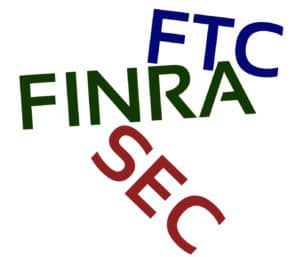 Woodie: I think it is very good to see that the Securities and Exchange Commission was on top of this. It lets investors know that the regulators are closely watching what is happening. This will bring credibility to the marketplace knowing they are working to keep back actors out. It will also keep issuers in check and encourage platforms to do the proper diligence on their issuers so in order to avoid getting in trouble with the SEC or FINRA. In addition, it gives the Industry Association more credibility in its fight to bring transparency to the marketplace by coming up with standard association rules for all platforms to follow. By having platforms agree to a certain set of rules in order to maintain their membership will bring credibility to the marketplace which will further encourage investor dollars.
Woodie: I think it is very good to see that the Securities and Exchange Commission was on top of this. It lets investors know that the regulators are closely watching what is happening. This will bring credibility to the marketplace knowing they are working to keep back actors out. It will also keep issuers in check and encourage platforms to do the proper diligence on their issuers so in order to avoid getting in trouble with the SEC or FINRA. In addition, it gives the Industry Association more credibility in its fight to bring transparency to the marketplace by coming up with standard association rules for all platforms to follow. By having platforms agree to a certain set of rules in order to maintain their membership will bring credibility to the marketplace which will further encourage investor dollars.
Erin: What parts of Title III rules do you believe need to be improved?
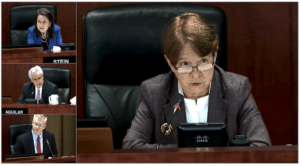 Woodie: There are 2 sections that need to be improved. The first is the liability standard for the portals. Funding portals should not be liable for any material omissions or misstatements of the issuer. They are not compensated or have the team and experience necessary to do the diligence necessary to uncover material misstatements. If the legislation approved by Congress and signed into law by the President meant to include funding portals in the liability, it would have directly named “funding portals” in the list of those liable, forcing funding portals to diligence deals and be paid for that service like a broker. Funding portals play a limited role and shouldn’t be held to the same liability standards as brokers. The second issue is that of compliance. Issuers need to complete and submit forms all while raising money from the crowd. It is critically important that they are compliant with these filings or they can lose their exemption. This means they would have to submit to all the filings of a public company, which would bankrupt any small issuer.
Woodie: There are 2 sections that need to be improved. The first is the liability standard for the portals. Funding portals should not be liable for any material omissions or misstatements of the issuer. They are not compensated or have the team and experience necessary to do the diligence necessary to uncover material misstatements. If the legislation approved by Congress and signed into law by the President meant to include funding portals in the liability, it would have directly named “funding portals” in the list of those liable, forcing funding portals to diligence deals and be paid for that service like a broker. Funding portals play a limited role and shouldn’t be held to the same liability standards as brokers. The second issue is that of compliance. Issuers need to complete and submit forms all while raising money from the crowd. It is critically important that they are compliant with these filings or they can lose their exemption. This means they would have to submit to all the filings of a public company, which would bankrupt any small issuer.
Erin: Any predictions for Title III’s mid-2016 roll out?
Woodie: Here are my predictions:
1) Issuers will rush to the starting gate on May 16th only to realize that all the money they expected to appear isn’t magically there. They will come to the realization that raising money is a hard thing and this is just a new way to do a difficult thing, not an easy road to free money.
2) Portals will rush into the space thinking this is a technology play and not realize this is a highly-regulated securities play. Someone will get into big trouble and potentially go to jail. FINRA and the SEC will be watching what is happening in the industry and more than one cease and desist letter will go out. The Wall Street Journal will cover it in a rationale way, The New York Times will decry crowdfunding from an investor protectionist point of view.
3) A new breed of Regulation Crowdfunding companies will emerge including:
a. Crowdfunding insurance to protect portals and issuers from material liabilities
b. An SAS compliance technology tool to streamline the reporting and filing requirements for issuers
c. An investor relations tool that allows issuers to easily communicate with investors, crowdsource knowledge and experience from them to build smarter companies and start a new form of buzz marketing that leverages investors as marketing agents with a vested interest in the success of the business rather than passive investors
 4) Investors will realize they want to play in the space but don’t have enough time to diligence deals. So they will deploy capital as such:
4) Investors will realize they want to play in the space but don’t have enough time to diligence deals. So they will deploy capital as such:
a. By following big names (VCs or Angels) in the space that are going in on deals.
b. By co-investing alongside a larger group or entity that is willing to fund a deal provided the crowd comes in with enough interest
c. By dropping money into funds
i. That have full-time managers doing the required diligence and picking out the best bets among all the platforms/players out there and/or
ii. That platforms offer to allow investors to own a piece of every deal funded on their sites
 5) Entrepreneur and Investor education will turn out to be the most important thing. Platforms will realize that entrepreneurs (aka issuers) haven’t taken the time to adequately educate themselves about their roles and responsibilities with investor’s money. And investors will realize there is a lot to learn about vetting businesses, understanding disclosures and how to mitigate risk. Platforms will require issuers and investors to prove their understanding via 3rd party education programs.
5) Entrepreneur and Investor education will turn out to be the most important thing. Platforms will realize that entrepreneurs (aka issuers) haven’t taken the time to adequately educate themselves about their roles and responsibilities with investor’s money. And investors will realize there is a lot to learn about vetting businesses, understanding disclosures and how to mitigate risk. Platforms will require issuers and investors to prove their understanding via 3rd party education programs.
6) The world will start to see the rationale adoption of debt and equity crowdfunding in the USA and begin to mimic similar frameworks globally. This will begin the discussion on how to leverage technology to solve cross-border capital flow challenges and allow investors to diversify their crowdfund investments globally.
7) Institutional money will start to flow into the infrastructure of crowdfunding. As the marketplace evolves, the larger institutions that currently control the power in the market will begin to make strategic investments either via funds or directly into companies and technologies they want to acquire.
 8) Mergers will start to take place. The platforms that have been around the longest have built great brand equity however they’ve also burned through millions of dollars of capital. Investors might shy on the thought of follow on capital or question their ability to scale. This will force industry mergers that will promote stronger platforms that get funded with deeper coiffeurs.
8) Mergers will start to take place. The platforms that have been around the longest have built great brand equity however they’ve also burned through millions of dollars of capital. Investors might shy on the thought of follow on capital or question their ability to scale. This will force industry mergers that will promote stronger platforms that get funded with deeper coiffeurs.
9) Crowdfunding will become mainstream as the media begins to cover in depth. A version of The Voice for Crowdfunding will emerge that will allow Americans to vote with their dollars on ideas that should become companies but rather than get a song in their itunes account get a share in their etrade account that might turn into something some day.
10) Local chambers of commerce will be flooded with crowdfunding requests and complaints about banks. One of them will figure out how to create a platform that allows the community to be the lender, the chamber to be the platform and the local businesses to get the capital they need to stay afloat. This will further re-energize local communities, create local jobs and engage citizens around the local businesses they love the most.
Erin: Where do you see the crowdfund investing industry in the next 3 years? 5 years?
 Woodie: I expect these crowdfunding technology companies to be absorbed by the larger financial institutions that control the capital markets and hence the money. The current players see and understand what is happening and they have no intention of losing any of the money or power they wield in the market. Right now they are waiting to see which are the breakout winners, who makes what mistakes and how are they punished. Once the dust settles, they’ll be acquiring.
Woodie: I expect these crowdfunding technology companies to be absorbed by the larger financial institutions that control the capital markets and hence the money. The current players see and understand what is happening and they have no intention of losing any of the money or power they wield in the market. Right now they are waiting to see which are the breakout winners, who makes what mistakes and how are they punished. Once the dust settles, they’ll be acquiring.
__________________________________________________
Main benchmarking survey link:
-
https://www.surveymonkey.com/r/AltFinAmericas
- For Spanish version: https://es.surveymonkey.com/r/AltFin_Spanish
- For Portuguese version: https://pt.surveymonkey.com/r/AltFin_Portuguese
- For Canadian Platforms: https://www.surveymonkey.com/r/AltFin_Canada
The study is supported by the Inter-American Development Bank (IDB), Business Development Bank of Canada (BDC), KPMG and a number of leading industry research partners.
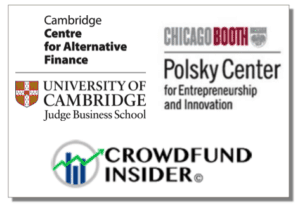 Crowdfund Insider has joined with The University of Cambridge, University of Chicago Booth School of Business and Crowdfund Capital Advisors to be the exclusive media partner on this benchmarking research. This interview is one of a series that includes multiple, in-depth interviews with international thought leaders and alternative finance industry pioneers from the collaborating associations.
Crowdfund Insider has joined with The University of Cambridge, University of Chicago Booth School of Business and Crowdfund Capital Advisors to be the exclusive media partner on this benchmarking research. This interview is one of a series that includes multiple, in-depth interviews with international thought leaders and alternative finance industry pioneers from the collaborating associations.
For benchmarking research enquiries please contact:
Dr. Robert Rosenberg, Chicago Booth School of Business (Robert.Rosenberg@ChicagoBooth.edu)
Tania Ziegler, Cambridge Centre for Alternative Finance, Cambridge Judge Business School (tz285@cam.ac.uk)
About the University of Cambridge, the University Chicago and Crowdfund Capital Advisors
University of Cambridge
This research is led by the Cambridge Centre for Alternative Finance, Cambridge Judge Business School. The Cambridge Centre for Alternative Finance is an international, interdisciplinary, academic research institute, dedicated to the study of alternative finance, which includes financial channels and instruments that emerge outside of the traditional financial system (i.e. regulated banks and capital markets).
Examples of alternative finance channels are online ‘marketplaces’ such as equity and rewards-based crowdfunding, peer-to-peer consumer/business lending, and third-party payment platforms. Alternative instruments include SME mini-bonds, private placements and other ‘shadow banking’ mechanisms, as well as social impact bonds and community shares used by non-profit enterprises and alternative currencies. The mission of the University of Cambridge is to contribute to society through the pursuit of education, learning and research at the highest international levels of excellence.
University of Chicago Booth School of Business
The University of Chicago Booth School of Business is consistently ranked among the top five business schools in the world. The school’s faculty includes renowned scholars and its graduates occupy key positions in the US and worldwide. The Chicago Approach to Management Education is distinguished by how it leverages fundamental knowledge, its rigor, and its practical application to business challenges.
The school offers full and part-time MBA programs, a PhD program, open enrollment executive education and custom corporate education with campuses in Chicago, London, and Hong Kong.



